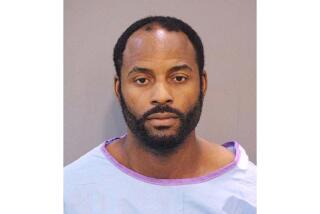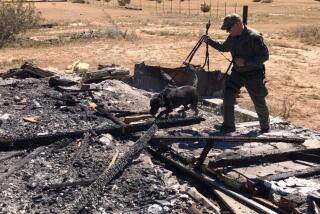Defense Witnesses in Helms Trial Raise Doubts About Evidence
- Share via
VAN NUYS — The defense opened its case Friday in the trial of David Helms on charges of beating to death his 2 1/2-year-old son Lance, waiving an opening statement and calling witnesses who appeared to do Helms more harm than good.
Before the trial, defense attorney Jack Stone maintained that conflicting medical evidence raised legitimate doubts about whether it was Helms or his former girlfriend, Eve Wingfield, who fatally beat the toddler in their North Hollywood apartment.
But on the first day’s testimony, Stone called witnesses who failed to undercut prosecutors’ contention that Wingfield had left the apartment before Lance’s beating, raised questions about Helms’ character and opened the door for prosecutors to point out flaws in the initial police investigation of Wingfield.
Wingfield served 21 months of a 10-year prison sentence for Lance’s death after a court-appointed public defender advised her she faced the possibility of life in prison on a murder charge and convinced her to accept a plea bargain.
The recommendation was based on expert testimony by coroner James K. Ribe, who said at Wingfield’s preliminary hearing that Lance died 30 minutes to an hour after being repeatedly and violently hit in the abdomen.
*
Ribe later told Los Angeles police detectives that the injuries to the boy were so severe, he was killed instantaneously. He repeated that conclusion in testimony this week, saying he had learned more about the medical issues involved and calling his earlier judgment “just ridiculous.”
The revised estimate--moving the killing to a time when Wingfield was not present--helped convince a Superior Court judge to free Wingfield last September.
On Friday, Stone called Dr. Marie Russell, who was working under Ribe at the county coroner’s office as a trainee when the autopsy on Lance was performed.
Russell testified that she told police the little boy could have asked for water after being hit, appearing to bolster the defense contention that he lived for a while after the beating and that Wingfield could have been the killer.
But after reviewing her 1995 report Friday, Russell said a police detective investigating the crime “misinterpreted what I said.”
Next, Stone called Los Angeles Police Det. Jiro Oka, who investigated Lance’s death April 6, 1995.
Oka stuck to his assertion that he was told the boy could have died over a one- to three-hour period. Asked on cross-examination if he ever asked medical officials how soon the boy was incapacitated, Oka answered, “I don’t think, specifically.”
Oka told Deputy Dist. Atty. Eleanor J. Hunter he did not ask doctors how soon Lance went into shock or how he would have acted after such a beating. “I didn’t ask how many blows or how the child would have reacted,” he said.
*
Earlier in the day, Jerome P. Goldman, who employed Helms at the Advanced Liquidators office supply store in North Hollywood, testified before the jury and Superior Court Judge Sandy Kriegler.
Goldman said Helms was “totally devastated . . . totally distraught” the day after his son died. But he also testified that Wingfield was “good with kids” and that Helms had a short temper “at times.”
Wingfield was also called back to the stand to explain why her 4-year-old son Calvin--Lance’s half brother--told authorities he saw his mom “sock Lance in the stomach.”
Wingfield replied that Calvin “was freaking out” after she discovered Lance lying on the couch of their studio apartment, pale, limp and unconscious.
Wingfield said Calvin couldn’t tell the “difference between a truth and a lie” and had given three different explanations to authorities about who hit Lance, including that the culprit was an army man and an Indian.
More to Read
Sign up for Essential California
The most important California stories and recommendations in your inbox every morning.
You may occasionally receive promotional content from the Los Angeles Times.













